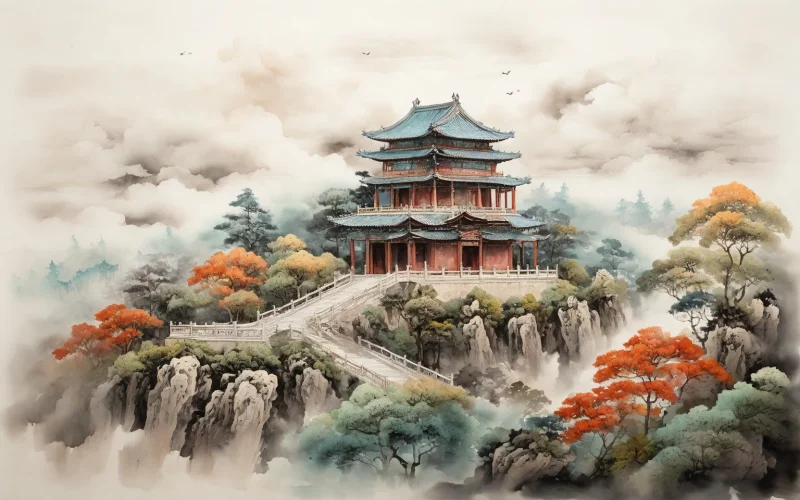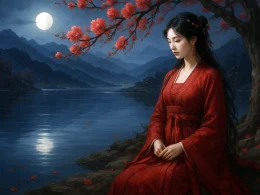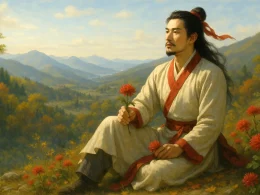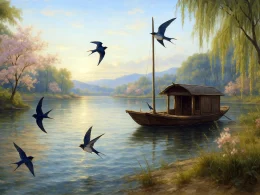When leaves shiver and fall, I see the poet drear;
Gallant and elegant, he is my master dear.
Looking back a thousand springs, can I not shed tears?
Desolate for long, we are not of the same years.
His autumn song's left in his old home by the stream.
Did clouds bring showers for flowers in the king's dream?
Even the royal palace falls now in decay,
The boatman points to the ruins in doubt today.
Original Poem:
「咏怀古迹 · 其二」
杜甫
摇落深知宋玉悲,风流儒雅亦吾师。
怅望千秋一洒泪,萧条异代不同时。
江山故宅空文藻,云雨荒台岂梦思。
最是楚宫俱泯灭,舟人指点到今疑。
Interpretation:
In his later years, Du Fu drifted through Jiangling. Passing by the hometown of Song Yu, the renowned poet of the Chu Ci anthology, he was inspired to compose this poem, expressing his admiration for Song Yu’s talent and aspirations while lamenting his own misfortune of being unrecognized.
First Couplet: “摇落深知宋玉悲,风流儒雅亦吾师。”
(The falling leaves of autumn make me deeply understand the sorrow in Song Yu’s *Jiu Bian; his elegance and refinement are the qualities I strive to emulate.)
Du Fu reflects on the autumnal scene of wilting foliage, evoking the melancholic sentiment of Song Yu's Jiu Bian. He acknowledges Song Yu’s "elegance and refinement" as an inspiration for his own literary pursuits.
Second Couplet: “怅望千秋一洒泪,萧条异代不同时。”
(Gazing across a thousand years of history, I cannot help but shed sorrowful tears; though separated by time, the desolation of unfulfilled talent binds us together.)
Du Fu laments the shared fate of being unrecognized in their respective eras, drawing a poignant parallel between their lives and shedding tears for the unchanging plight of literary talent across the ages.
Third Couplet: “江山故宅空文藻,云雨荒台岂梦思。”
(The landscapes remain, but Song Yu’s old home is now only marked by his words; the tale of clouds and rain at the desolate terrace—could it truly have been just a dream?)
Du Fu critiques how future generations focus on Song Yu’s literary achievements while neglecting his aspirations, and laments the misinterpretation of the myth of the Goddess of Mount Wu.
Fourth Couplet: “最是楚宫俱泯灭,舟人指点到今疑。”
(The most lamentable loss is that the grand palaces of Chu are entirely gone; now, boatmen point out ruins with uncertain claims.)
By referencing the fall of the Chu Kingdom, Du Fu underscores the impermanence of history, expressing doubt and dissatisfaction with the boatmen’s casual identifications of historical sites.
Writing Features:
- Integration of Emotion and Scenery: Du Fu uses the autumnal imagery of decay to mirror Song Yu’s melancholic sentiments, blending emotion and environment seamlessly.
- Insightful Commentary: Through Song Yu’s tragic tale of unrecognized talent, Du Fu critiques societal tendencies to undervalue the ambitions of literati.
- Combination of Real and Imagined: The poet interweaves depictions of actual landscapes with imagined scenes from Song Yu’s life, juxtaposing historical continuity with individual experience.
- Masterful Allusions: References to Jiu Bian and the legend of the Goddess of Mount Wu are seamlessly woven into the poem, enhancing its depth and resonance.
Overall Appreciation:
This poem, composed during Du Fu’s visit to Song Yu’s homeland, is permeated with deep emotion and sharp insights. The poet blends a heartfelt tribute to Song Yu with reflections on his own unfulfilled aspirations. The first half highlights Song Yu’s plight, while the latter half critiques the misrepresentation of his legacy and laments the transient nature of history. The poem’s undertone of national concern underscores Du Fu’s broader hopes for enlightened governance and societal improvement.
Insights:
Through this poem, Du Fu illuminates the tragedy of unrecognized talent while critiquing the misrepresentation and neglect of historical figures and events. It serves as a reminder to approach history with a balanced and comprehensive perspective, preserving cultural and spiritual legacies. The poet’s reflections on Song Yu also convey a patriotic concern, urging future generations to value peace and honor the contributions of great individuals to the nation’s welfare.
Poem translator:
Xu Yuan-chong (许渊冲)
About the poet

Du Fu (杜甫), 712 - 770 AD, was a great poet of the Tang Dynasty, known as the "Sage of Poetry". Born into a declining bureaucratic family, Du Fu had a rough life, and his turbulent and dislocated life made him keenly aware of the plight of the masses. Therefore, his poems were always closely related to the current affairs, reflecting the social life of that era in a more comprehensive way, with profound thoughts and a broad realm. In his poetic art, he was able to combine many styles, forming a unique style of "profound and thick", and becoming a great realist poet in the history of China.











